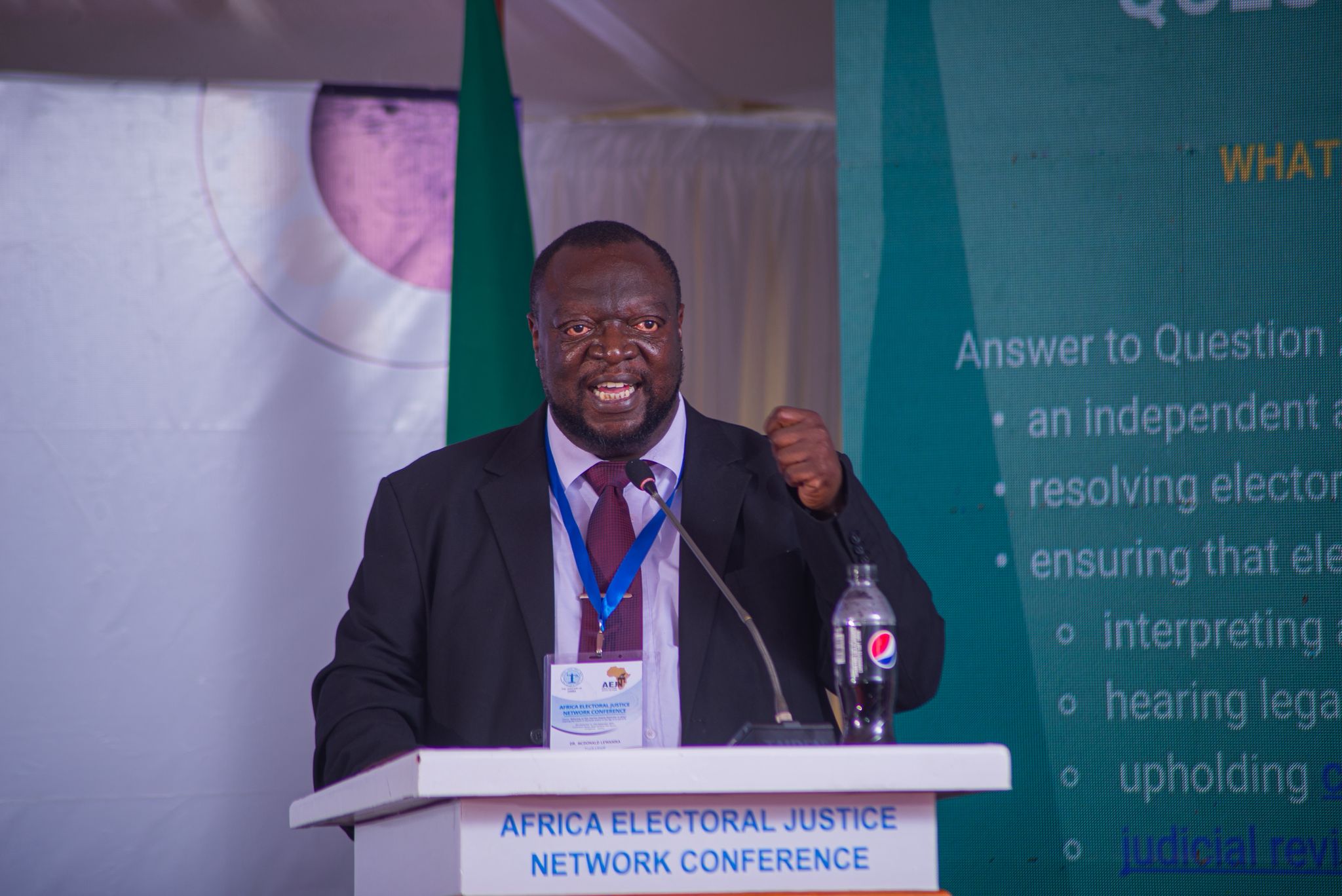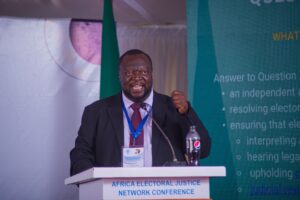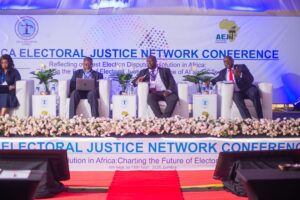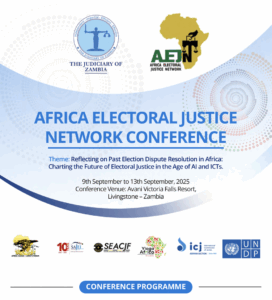NEWS

IN BRIEF
Public confidence in the judiciary across Africa has declined by […]
SHARE

ALESA’s Regional Director, Dr. McDonald Lewanika, presenting on Building Public Confidence in Electoral Dispute Resolution.
Public confidence in the judiciary across Africa has declined by at least 10 percentage points since 2011, with profound implications for public trust in judicial outcomes, especially in electoral dispute resolutions (EDR), according to Dr. McDonald Lewanika, Regional Director of Accountability Lab East and South Africa (ALESA).
Speaking at the 4th Annual Conference of the Africa Electoral Justice Network (AEJN) in Livingstone, Zambia, from 9–13 September 2025, Lewanika cited Afrobarometer’s 2024 data to demonstrate the significant trust deficit between the public and the courts. The data revealed that, on average, 47% of African citizens trusted the courts, with substantial variation. He pointed out Tanzania at 88%, Malawi at 62%, and Zambia at 65% as leading in terms of public confidence, whilst Nigeria at 28% and several other West African states were performing poorly. Lewanika emphasised the court’s role as the arbiter of electoral disputes by ensuring elections were lawful, interpreting election laws, adjudicating results and irregularities, and upholding constitutional principles.
“The judiciary must act as an independent and impartial arbiter and must act with integrity and fairness throughout different phases of the electoral process, not just on results disputes, because how you do one thing is basically how you do everything, making the task of confidence building and every day and every case process”.
Lewanika highlighted several challenges that undermine public trust in electoral dispute resolution. He noted that part of the lack of confidence in EDR originated from judges’ conduct, who, in some instances, showed little regard for their obligation to be accountable to the law and the public. He added that the issue is worsened by the courts’ need to balance fulfilling constitutional deadlines with thorough investigations, ensuring equal access to justice for all parties, addressing perceptions of bias or judicial capture, and making rulings more transparent and understandable to the public.
He highlighted how, in Kenya (2017), the Supreme Court’s annulment of a presidential election upheld its constitutional duty to safeguard democratic will and how, in Malawi (2019), the courts emphasised the credibility of the process, delivering a detailed judgment and ordering a rerun, which reinforced perceptions of judicial independence.

However, Dr Lewanika argued that public confidence is not only boosted by the quality of the verdicts issued by the courts but also by the additional activities surrounding the cases. Using the 2012 Ghana elections as an example, he highlighted how the transparency of the courts, through public broadcasting of the Presidential petition case, promoted openness but also exposed proceedings to perceptions of bias. Nevertheless, this level of transparency was also vital in securing the loser’s consent to the process, leading to a peaceful transition, albeit a few months later.
In contrast, in Nigeria and Zimbabwe (2018), courts dismissed petitions on technical grounds without addressing broader credibility concerns, which Lewanika said weakened confidence in the process. He praised the work of the judiciary in Malawi in 2019 and 2020 for explaining their decisions and engaging with the election’s ecosystem, including civil society and the media, to clarify the verdict and make it understandable for the public. He argued that this approach contributes to Malawi’s high level of public trust and possibly also in Tanzania, where the use of Swahili- the lingua franca- makes court judgements easier for the public to comprehend.
Lewanika proposed a series of measures to address some of the challenges. These include:
- Improving transparency and communication through reasoned judgments and public education.
- enhancing capacity building and reform through judicial training on EDR in between elections, reviewing past performance and making requisite adjustments to adjudication processes, electoral laws, and procedures in between elections,
- Peer and cross-learning amongst different judiciaries on the continent
- streamlining certain electoral petition procedures to guarantee access to justice and improve clarity for candidates and the public.
- adopting an ecosystem approach that involves media, civil society, EMBs, and citizens.
- applying a social justice perspective that emphasises fairness, participation, and representation; and
- strengthening institutional safeguards such as judicial independence, transparent appointments, and financial autonomy.
The Accountability Lab Director argued that the effectiveness of Electoral Dispute Resolution and the pursuit of electoral justice depends not only on institutional actions and reforms but also on whether citizens can see justice being done. He emphasised that the way disputes are resolved directly affects the credibility of electoral processes and broader democratic legitimacy.
Lewanika emphasised the importance of embedding integrity within Africa’s electoral systems: “Justice must not only be done, but it must be seen to be done,” he said, echoing Lord Chief Justice Hewart’s words.
“Citizens must perceive the judiciary as consistently acting with integrity, considering it the norm rather than the exception. They should not be surprised when the judiciary in EDR carries out the right decision, as demonstrated in Malawi and Kenya. This should be expected, and people should be shocked when there is any deviation from impartiality, fairness, and integrity.”
The AEJN Conference convened Supreme Court Justices, including the Chief Justices from Zambia (Chief Justice Honourable Dr. Mumba Malila, SC) and Malawi (Chief Justice Honourable Rizine R. Mzikamanda SC), along with several Deputy Chief Justices, High Court judges, electoral management bodies (EMBs), civil society leaders, and legal experts. The theme of the conference was “Reflecting on Past Electoral Dispute Resolution in Africa: Charting the Future of Electoral Justice in the Age of AI and ICTs.” Dr Lewanika participated in a panel chaired by Honourable Justice Mr. Kenneth Mulife of the Constitutional Court of Zambia, with Mr. Felix Owuo, Executive Director of ELGIA, and Ms. Julie Matheka, Programme Manager at ICJ Kenya.

African Electoral Justice Network Conference Program
– by Bathabile Dlamini | Media and Communications Officer
